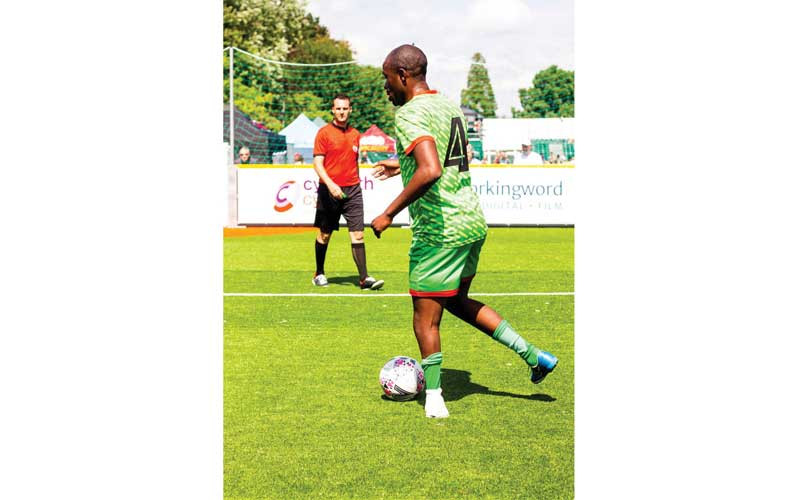
In recent years, sport for development programmes have emerged as powerful platforms for creating an inclusive environment that enables people with disabilities to actively participate in sport.
While there have been notable achievements and success stories of disabled athletes in Zimbabwe, it is important to acknowledge that the representation of people with disabilities in sport is still limited.
There is lack of visibility and recognition of disabled athletes, and their participation in mainstream sporting events and competitions remains relatively low.
Young Achievement Sports for Development (YASD), as a sport for development organisation, has been playing a pivotal role in advocating for the inclusion of people with disabilities in sports.
The organisation’s programmes provide opportunities and support, which empower individuals with disabilities to feel comfortable participating in sports, regardless of their circumstances. Kudakwashe Mapira, Blessing Makirimira and Douglas Masiyazi who represented Zimbabwe in different editions of Homeless World Cup serve as inspiring case studies, showcasing the transformative power of sport for development.
The main barrier to the participation of people with disability in sport is the lack of accessible infrastructure and facilities that cater to the specific needs of disabled athletes.
This includes accessible changing rooms, ramps, and specialised equipment that enable individuals with disabilities to participate fully. Sport for development programs therefore do not focus on the professional development of the athlete but focus on the social aspects and recognize the inherent potential and abilities of people with disabilities.
These programmes aim to break down barriers and challenge societal perceptions by creating inclusive spaces that foster equal opportunities for all.
- Homeless World Cup transforms ‘Terminator’
- Homeless World Cup transforms ‘Terminator’
- Zimbabwe eyes Homeless World Cup return
- YASD kick start 2024 Homeless World Cup preps
Keep Reading
Through the Homeless World Cup, YASD has been advocating for the inclusion of people with disabilities to participate in the global street soccer tournament.
The Homeless World Cup provides a platform for individuals who have experienced homelessness, including those with disabilities, to showcase their skills, build confidence, and transform their lives through the power of sport.
Mapira is a physically disabled footballer suffering from congenital limb disorder, where he was born with a missing foot, exemplifies the transformative impact of sports for development.
The footballer participated and captained the 2019 Zimbabwe Homeless World Cup team.
Mapira through his participation in YASD's programmes is now a global sports ambassador for people with disability. His involvement in sports allowed him to develop a sense of purpose, build self-confidence and break free from societal limitations and is now inspiring many people with his determination and resilience.
Masiyazi is another young person with a disability and is passionate about football. A person living with albinism, Masiyazi has faced numerous obstacles in his journey as a football player.
His skin condition does not allow him to be exposed to direct sunlight for prolonged periods. This resulted in many coaches not wanting to give him a chance to play football with others.
However, through YASD's inclusive programmes, he was able to develop his footballing skills and gain confidence in his abilities.
Masiyazi’s participation in the Homeless World Cup not only allowed him to showcase his talent but also shattered societal stereotypes about people with albinism.
His success on the international stage serves as a testament to the importance of inclusive sports programs in empowering individuals with disabilities.
Sports for development programs recognize the need to empower people with disabilities by creating a supportive and inclusive environment that promotes participation.
These initiatives provide adaptive equipment, specialized coaching, and tailored training programs to address the specific needs of individuals with disabilities.
By focusing on their abilities rather than their disabilities, sports for development programs help individuals overcome physical and societal barriers, fostering a sense of belonging and empowerment.
Unlike professional sporting programs, sports for development programs promote social inclusion and challenge stigmatization. Through sports, individuals with disabilities are given the opportunity to interact with their peers, build friendships, and develop a support network.
The camaraderie and teamwork fostered in these programs create a sense of community and acceptance, enabling individuals to feel comfortable and valued in their sporting pursuits.
Sports for development programs have proven to be powerful catalysts for creating an inclusive environment that empowers people with disabilities to participate in sports.
YASD's efforts, exemplified through the Homeless World Cup, have played a pivotal role in advocating for the inclusion of people with disabilities in mainstream sports.






